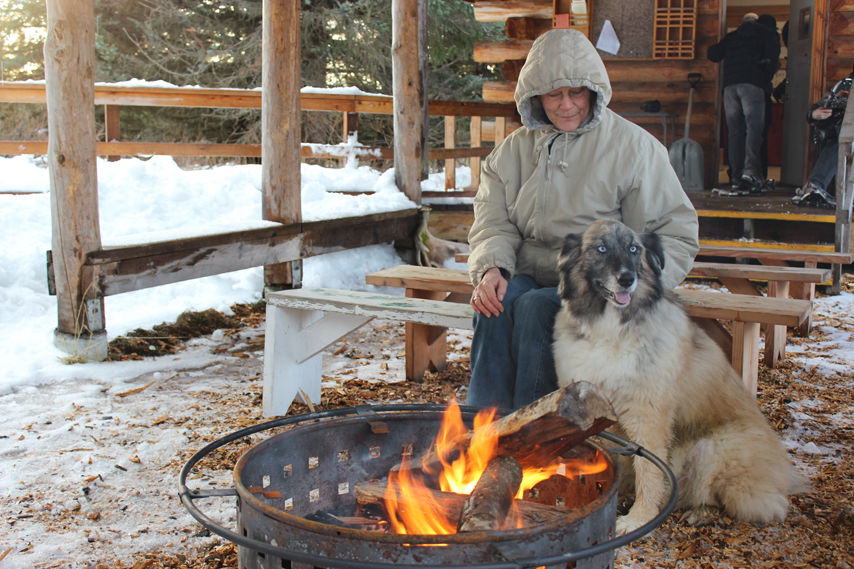Oh, what a difference a few hundred feet in elevation can make.
At sea level Sunday, it was spring-like. Green grass poked through melting layers of snow on front yards and temperatures actually reached the low 40s. Up on East Skyline Drive, the sun was shining, but there was definitely more snow and the warm bonfire at Center for Alaskan Coastal Studies’ Wynn Nature Center marked the beginning of CACS’ Sunday bonfires, a free, family-friendly event.
The bonfires are based at the covered pavilion of the Daisy Lee Bitter interpretive log cabin. They occur every Sunday from 2-4 p.m., beginning last Sunday and continuing until sometime in March.
“There are optional activities to do,” said Loretta Brown, CACS special program coordinator. “There’s snowshoeing, sledding and some survival skills practicing. We have a bonfire going the whole time, ingredients to make s’mores, hot water going in the cabin. The snowshoes are definitely family friendly, there’s sledding and the trails are open.”
Snowshoes are available through CACS other days of the week, for a rental fee of $5 for three days and are kept at the CACS headquarters on Lake Street. However, at the Sunday bonfire, Brown makes sure there’s a selection at hand, everything from a size small enough for 3-year-olds to bigger adult sizes, and the use of them is free. It also is perfectly acceptable to bring your own snowshoes and sleds and if building an igloo sounds like a fun thing to try, have at it.
“The snow is perfect for building igloos right now,” said Brown.
Last winter, HoWL, Homer Wilderness Leaders, constructed an impressive dome out of snow blocks that provided a cozy shelter for students and other visitors to the center.
“We mostly want to encourage people to get out,” said Brown.
Throughout the winter, CACS also uses the nature center as a site for winter fieldtrips for schools or “any group that would like to do some kind of environmental education,” said Brown.
The center’s 140 acres has a trail system extending more than five miles. In addition, there are 800 feet of boardwalks that are currently above the snow’s surface. Either route offers opportunities to see what wildlife might be in the area.
“There are quite a few tracks,” said Brown. “Lots of snowshoe rabbits, lynx, moose and there’s a game camera set up so you can take a look at that.”
Another avenue to encourage more outdoor recreation is CACS’ Wynn50 Challenge. Kicked off at the Rotary Health Fair in November, its goal is to get participants to walk, ski, snowshoe or run 50 miles by June 14 when the Wynn Nature Center begins its summer season. Occasional events keep the enthusiasm alive, such as planned hikes for families. Sign-up is free and can be done at the CACS Lake Street headquarters, where participants are given a recording sheet to track their miles. About 75 participants have signed up to date.
“It’s just nice to have a little motivation. It makes it easier to go out if other people are saying, ‘Come on, let’s get going,’” said Brown.
A third activity going on through the winter is CACS’ marine debris workshop held at 2614 Clover Place, across from American Legion Post 16 on East End Road. The workshop is 3:30-6 p.m. on Mondays and Wednesdays. Art sculptures are being created that will become part of a curriculum for a traveling exhibit.
“If people are interested and want to check out what has been done in the past, there are two pieces on display at the (CACS) office and the Homer Public Library will have one on display from the end of January through March,” said Brown.
For more information about these and other Center for Alaskan Coastal Studies programs, call 235-6667, email info@akcoastalstudies.org or visit the web at akcoastalstudies.org.
McKibben Jackinsky can be reached at mckibben.jackinsky@homernews.com.


